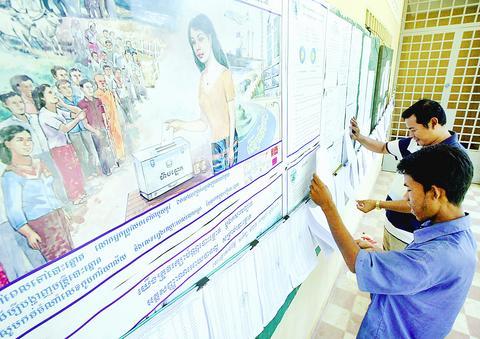Jammed into buses and cars, tens of thousands of Cambodians left the capital yesterday to return to their villages for today's general election, which marks another step from the horror of the `Killing Fields.'
If they pass peacefully, the polls to elect a new 123-seat National Assembly will be a rare positive achievement for the troubled southeast Asian nation, still struggling with the legacy of Pol Pot and the Khmer Rouge genocide of the 1970s.

PHOTO: AFP
An estimated 1.7 million people were executed or died of torture, disease or starvation in the vast rural labour camps which would become known as the "Killing Fields."
Election monitors say the number of political killings in the run-up to the elections is down compared to violent national polls in 1993 and 1998, although voter intimidation -- particularly in the remote jungle-clad provinces -- remains widespread.
There was little evidence of fear in the carnival atmosphere which prevailed on the final day of official campaigning on Friday as thousands of supporters of the three main parties paraded their flags and banners through Phnom Penh's streets.
A cooling off "Day of Silence," yesterday was a chance for thousands in the capital to return to their villages to cast their votes.
The ruling party of Prime Minister Hun Sen, a one-eyed former Khmer Rouge soldier, is expected to win the polls comfortably.
However, the royalist FUNCINPEC and opposition Sam Rainsy Party, run by Hun Sen's arch enemy, French-educated former finance minister Sam Rainsy, hope to deny him enough seats for an absolute majority.
The National Election Commission (NEC) said heavy rains were hampering efforts to deliver ballot-boxes to some remote jungle outposts.

FRUSTRATIONS: One in seven youths in China and Indonesia are unemployed, and many in the region are stuck in low-productivity jobs, the World Bank said Young people across Asia are struggling to find good jobs, with many stuck in low-productivity work that the World Bank said could strain social stability as frustrations fuel a global wave of youth-led protests. The bank highlighted a persistent gap between younger and more experienced workers across several Asian economies in a regional economic update released yesterday, noting that one in seven young people in China and Indonesia are unemployed. The share of people now vulnerable to falling into poverty is now larger than the middle class in most countries, it said. “The employment rate is generally high, but the young struggle to

STEPPING UP: Diminished US polar science presence mean opportunities for the UK and other countries, although China or Russia might also fill that gap, a researcher said The UK’s flagship polar research vessel is to head to Antarctica next week to help advance dozens of climate change-linked science projects, as Western nations spearhead studies there while the US withdraws. The RRS Sir David Attenborough, a state-of-the-art ship named after the renowned British naturalist, would aid research on everything from “hunting underwater tsunamis” to tracking glacier melt and whale populations. Operated by the British Antarctic Survey (BAS), the country’s polar research institute, the 15,000-tonne icebreaker — boasting a helipad, and various laboratories and gadgetry — is pivotal to the UK’s efforts to assess climate change’s impact there. “The saying goes

ENERGY SHIFT: A report by Ember suggests it is possible for the world to wean off polluting sources of power, such as coal and gas, even as demand for electricity surges Worldwide solar and wind power generation has outpaced electricity demand this year, and for the first time on record, renewable energies combined generated more power than coal, a new analysis said. Global solar generation grew by a record 31 percent in the first half of the year, while wind generation grew 7.7 percent, according to the report by the energy think tank Ember, which was released after midnight yesterday. Solar and wind generation combined grew by more than 400 terawatt hours, which was more than the increase in overall global demand during the same period, it said. The findings suggest it is

TICKING CLOCK: A path to a budget agreement was still possible, the president’s office said, as a debate on reversing an increase of the pension age carries on French President Emmanuel Macron yesterday was racing to find a new prime minister within a two-day deadline after the resignation of outgoing French Prime Minister Sebastien Lecornu tipped the country deeper into political crisis. The presidency late on Wednesday said that Macron would name a new prime minister within 48 hours, indicating that the appointment would come by this evening at the latest. Lecornu told French television in an interview that he expected a new prime minister to be named — rather than early legislative elections or Macron’s resignation — to resolve the crisis. The developments were the latest twists in three tumultuous